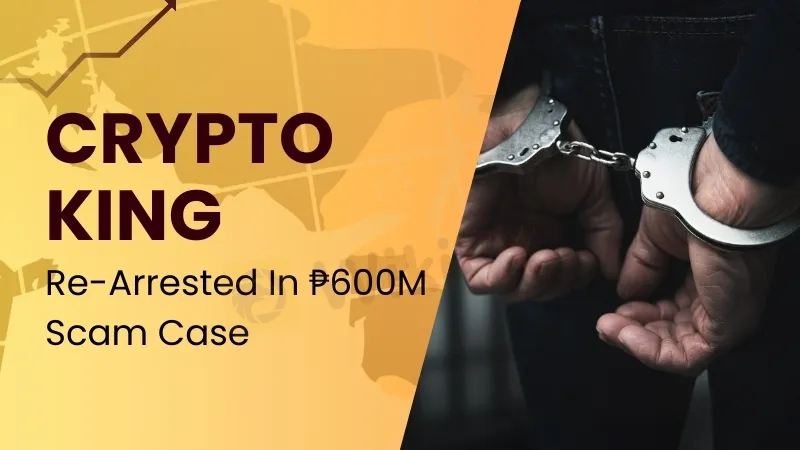简体中文
繁體中文
English
Pусский
日本語
ภาษาไทย
Tiếng Việt
Bahasa Indonesia
Español
हिन्दी
Filippiiniläinen
Français
Deutsch
Português
Türkçe
한국어
العربية
Crypto King Re-Arrested in ₱600M Scam Case
Abstract:Crypto King re-arrested in ₱600M scam case in Cavite, Philippines. PNP-CIDG reveals fraud involving casino funds and victims from media, law enforcement, and more.

The suspect, who was called the “Crypto King,” has been caught again in connection with a ₱600 million cryptocurrency scam. This is a big step forward in a well-known fraud case. The suspect was freed in 2023 after making bail for a previous estafa charge under Article 315 of the Revised Penal Code. He or she was then arrested again.
PNP-CIDG Confirms Crypto Kings Arrest
The person was caught by the Philippine National Police-Criminal Investigation and Detection Group (PNP-CIDG) in Barangay San Juan, Noveleta, Cavite, on October 7, 2024. The person was arrested because of two open warrants from courts in Makati and Parañaque. Authorities found the suspect to be a key figure in a ₱600 million cryptocurrency theft case. Victims were told they would get high returns but instead lost a lot of money.
At a news conference, Col. Marlon Quimno, Director of the PNP-CIDG National Capital Region, stressed that this was not a one-off crypto scam because the money was apparently being used in gambling. A lot of people from the media, the cops, and the government have been victims, making this a big cash crime.
Estafa Cases Still Going On
The suspect was first caught in September 2023 for reportedly using a similar crypto scam to steal more than ₱100 million from people. After posting bail of ₱54,000, more victims have come forward, and new estafa cases have been made in both Makati and Parañaque courts. The gains from theft are now thought to be between 500 million and 600 million pesos. The PNP-CIDG wants more victims to come forward to help the investigation and build a case for large-scale estafa, a crime that can't be released on bail.
Cryptocurrency Scam Operations Uncovered in Manila
As part of a larger effort to stop financial scams, more than 250 people were arrested in Manila during a raid on what was thought to be an online scam farm. Hundreds of phones, computers, and pre-registered SIM cards were found during the raid. These were apparently used in a number of scams, including Bitcoin scams. The police stated that most of the people they nabbed were not from the Philippines but from other countries, mostly China. Filipinos who took part in the scam will be charged in their own courts.
This action is part of the Philippine government's larger plan to fight organized financial fraud. There is growing pressure from around the world to deal with the rising number of crypto-related scams in Asia.
Effects of Cryptocurrency Fraud on a Large Scale
In the past few years, crypto scam cases have grown, and many victims are having a hard time reporting their losses and getting their money back. The fact that organized groups were involved in this big coin scam shows how complicated these schemes are. The police are still telling people to be careful and report any strange crypto-related actions to help stop more scam cases.
Related News:
In conclusion
The fact that the “Crypto King” was arrested again shows how dangerous Bitcoin scams are becoming in the Philippines. As victims came from a wide range of fields, from the media to law enforcement, this case shows how important it is to be more aware of and careful about large-scale financial scams.
Stay informed about the latest developments in cryptocurrency scams. Visit the WikiFX news page for more updates and insights!

Disclaimer:
The views in this article only represent the author's personal views, and do not constitute investment advice on this platform. This platform does not guarantee the accuracy, completeness and timeliness of the information in the article, and will not be liable for any loss caused by the use of or reliance on the information in the article.
Read more

Thailand’s War on Illegal Crypto: Five Firms Raided, Millions at Stake
In a significant move against illegal crypto-related activities, Thai authorities have cracked down on five unauthorized cryptocurrency firms operating within the country. The Economic Crime Suppression Division (ECD) conducted coordinated raids across Bangkok, Nakhon Pathom, and Samut Sakhon, leading to the arrest of 11 individuals involved in unlicensed electronic currency transactions. The operation underscores Thailand’s strict regulatory stance on financial crimes related to digital assets.

Why Hasn’t Binance Listed Pi Network (PI) Yet? Key Reasons Explained
Why hasn’t Binance listed Pi Network (PI)? Discover the key reasons, including mainnet restrictions, regulatory concerns, and what needs to happen for a future listing.

Famous Olympic Breakdancer’s Brother Faces Crypto Fraud Charges
Australian Olympic breakdancer Rachel "Raygun" Gunn’s brother, Brendan Gunn, accused of crypto fraud involving $181,000. ASIC investigates.

58-Year-Old Insurance Agent Fell Victim to a Multi-Million Ringgit Fraud
A 58-year-old insurance agent in Malaysia has lost RM1.58 million to an investment scam. Between 19 December 2024 and 20 February 2025, she made 27 transactions, sending funds to six different bank accounts under various companies.
WikiFX Broker
Latest News
Is TUOTENDA a cryptocurrency scam primarily targeting men over the age of 50?
Canada to Enforce Retaliatory Tariffs if U.S. Duties Persist
Unbelievable! Is the Yen Really Gaining Strength?
$13M Pig Butchering Scam: Three Arrested for Money Laundering
FINMA Opens Bankruptcy Proceedings
FCA Issues Warning Against 14 Unregistered Financial Firms
Crypto Scam Exposed: 3 Arrested for Defrauding Investors
Nifty 50 Index Futures Now Available at Interactive Brokers
Grand Unveiling: The Core Reasons Behind the Yen’s Rise
Ethereum’s Shock Drop: What’s The Real Reason?
Currency Calculator







